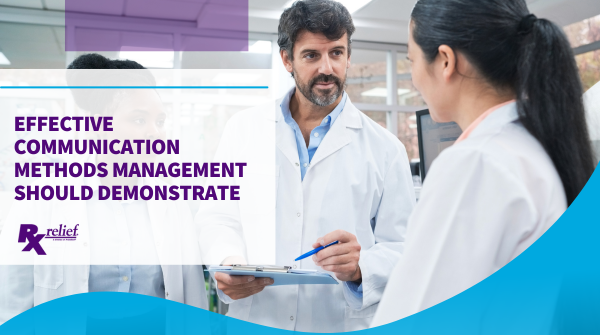Effective Communication Methods Management Should Demonstrate

Effective communication is a cornerstone for pharmacy managers in creating a collaborative work environment, ensuring efficiency, and providing excellent patient care. A range of techniques can be used to achieve clear, concise, and supportive communication within the pharmacy team. Here are a few.
Active Listening
One fundamental method is active listening. Pharmacy managers need to make sure they are listening carefully during team meetings, one-on-one sessions, or routine conversations. Active listening shows that you are taking employees’ concerns seriously, ensures instructions are understood, and encourages a two-way dialogue. It also builds trust and promotes a sense of community among team members.
Clarity
Clarity in messaging is equally important. Managers must articulate expectations, roles, and responsibilities in a way that leaves little room for ambiguity. Using simple language and avoiding excessive jargon ensures that everyone—from pharmacists to technicians—can easily grasp the intended message. Summarizing key points and inviting questions reinforces the message.
Feedback
Regular feedback is another essential communication tool. Timely feedback enables staff to recognize their strengths and address areas for improvement. Scheduled performance reviews and informal check-ins allow managers to acknowledge achievements while discussing concerns. This balanced approach motivates employees and contributes to refining operational processes within the pharmacy.
Nonverbal Communication
Effective communication extends beyond verbal interactions. Written communication, including emails, memos, and standard operating procedures, must be clear, organized, and accessible. Documents should include bullet points, clear headings, and concise language to facilitate quick understanding. In today’s digital age, using technology through messaging platforms such as MS Teams and Slack, shared calendars, and virtual meetings further enhances communication efficiency.
Non-verbal cues such as body language, tone, and facial expressions play a vital role as well. Maintaining eye contact, using an open posture, and a friendly tone can reinforce verbal messages and build stronger relationships.
Finally, creating an environment that encourages two-way communication is crucial. Pharmacy managers should actively seek feedback from their team, which creates mutual respect and a sense of ownership.
Continual Improvement
Additional training and continuous improvement in communication skills can further enhance the effectiveness of pharmacy managers. Attending professional workshops, seminars, and leadership courses helps refine their abilities to convey complex information and resolve conflicts.
Looking to hire pharmacists? Rx relief is ready to help.
As a top pharmacy staffing agency, we’ve earned Best of Staffing® awards for client and talent satisfaction. Discover how Rx relief can assist you—give us a call today.



